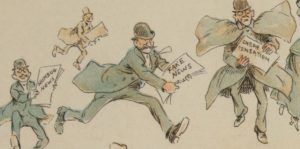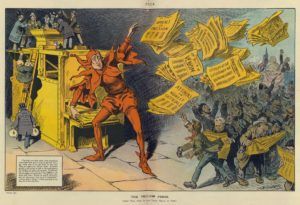Yellow Journalism: That Was Then, That Is Now
Skip to commentsIt is perhaps not so surprising to hear that the problem of “fake news” — media outlets adopting sensationalism to the point of fantasy — is nothing new.
Although these days his name is somewhat synonymous with journalism of the highest standards, through association with the Pulitzer Prize established by provisions in his will, Joseph Pulitzer had a very different reputation while alive. After purchasing The New York World in 1884 and rapidly increasing circulation through the publication of sensationalist stories he earned the dubious honour of being the pioneer of tabloid journalism. He soon had a competitor in the field when his rival William Randolph Hearst acquired the The New York Journal in 1885 (originally begun by Joseph’s brother Albert). The rivalry was fierce, each trying to out do each other with ever more sensational and salacious stories. At a meeting of prominent journalists in 1889 Florida Daily Citizen editor Lorettus Metcalf claimed that due to their competition “the evil grew until publishers all over the country began to think that perhaps at heart the public might really prefer vulgarity”.
Conflating the yellow journalism of 125 years ago with the partisan media of today
this five year old essay from The Public Domain Review seems even more on the mark now.


Comments
Comments are closed.